Fill in each numbered blank with one suitable word or phrase.
In the United States, almost everyone, at one time or another, has been a (1) _______. According to the US government statistics, about one-fifth of the American (2) _________ volunteer work each year. Americans have had the tradition of volunteering and (3)___ one another since the early days of the country. Americans volunteer not because they are forced or (4) ______ to do it. They (5)_____it! Traditional volunteer activities include (6)____ money for people in need, cooking and (7)___ food, doing general (8)_____ such as clean-up, and home (9)_____, providing transportation such as giving rides to the (10) ____ , and tutoring or mentoring young people.
Fill in each numbered blank with one suitable word or phrase.
In the United States, almost everyone, at one time or another, has been a (1) _______. According to the US government statistics, about one-fifth of the American (2) _________ volunteer work each year. Americans have had the tradition of volunteering and (3)___ one another since the early days of the country. Americans volunteer not because they are forced or (4) ______ to do it. They (5)_____it! Traditional volunteer activities include (6)____ money for people in need, cooking and (7)___ food, doing general (8)_____ such as clean-up, and home (9)_____, providing transportation such as giving rides to the (10) ____ , and tutoring or mentoring young people.
In the United States, almost everyone, at one time or another, has been a (1) _______.
In the United States, almost everyone, at one time or another, has been a (1) _______.
volunteer
voluntary
volunteering
voluntarily
Đáp án: A
Volunteer (n) tình nguyện viên
Voluntary (adj) tự nguyện
Voluntarily (adv) một cách tự nguyện
Volunteer (n) tình nguyện viên
Voluntary (adj) tự nguyện
Voluntarily (adv) một cách tự nguyện
Sau mạo từ “a” là một danh từ đếm được số ít
=> In the United States, almost every one, at one time or another, has been a volunteer.
(Ở Hoa Kỳ, hầu hết mọi người, lúc này hay lúc khác, đều là tình nguyện viên.)

According to the US government statistics, about one-fifth of the American (2) _________ volunteer work each year.
According to the US government statistics, about one-fifth of the American (2) _________ volunteer work each year.
make
have
get
do
Đáp án: D
do volunteer work (làm công việc tình nguyện)
make (v): tạo ra
have (v): có
get (v): lấy được, nhận được
do (v): làm
Cụm từ: do volunteer work (làm công việc tình nguyện)
=> According to the US government statistics, about one-fifth of the American do volunteer work each year.
(Theo thống kê của chính phủ Hoa Kỳ, khoảng một phần năm người Mỹ làm công việc tình nguyện mỗi năm.)
Americans have had the tradition of volunteering and (3)___ one another since the early days of the country.
Americans have had the tradition of volunteering and (3)___ one another since the early days of the country.
helping
giving
leaving
going
Đáp án: A
Help: giúp đỡ
Give: gửi, trao đi
Leave: rời đi
Go: đi
help (v): giúp đỡ
give (v): gửi, trao đi
leave (v): rời đi
go (v): đi
=> Americans have had the tradition of volunteering and helping one another since the early days of the country.
(Người Mỹ đã có truyền thống tình nguyện và giúp đỡ lẫn nhau kể từ những thuở ban đầu của đất nước.)
Americans volunteer not because they are forced or (4) ______ to do it.
Americans volunteer not because they are forced or (4) ______ to do it.
free
paid
praised
believed
Đáp án: B
Free: miễn phí, tự do
Paid: được trả tiền
Praised: ca ngợi
Believed: được tin tưởng
free (adj): miễn phí, tự do
paid (adj): được trả tiền
praised (adj): ca ngợi
believed: được tin tưởng
Cụm từ: be paid to do st (được trả tiền để làm gì)
=> Americans volunteer not because they are forced or paid to do it.
(Người Mỹ làm tình nguyện không phải vì họ bị ép buộc hoặc trả tiền để làm điều đó.)
Americans volunteer not because they are forced or paid to do it. They (5)_____it!
Americans volunteer not because they are forced or paid to do it. They (5)_____it!
hate
need
enjoy
want
Đáp án: C
PP:
Hate: căm ghét
Need: cần thiết
Enjoy: yêu thích
Want: muốn
hate (v): căm ghét
need (v): cần
enjoy (v): yêu thích
want (v): muốn
=> Americans volunteer not because they are forced or paid to do it. They enjoy it!
(Người Mỹ làm tình nguyện không phải vì họ bị ép buộc hoặc được trả tiền để làm điều đó. Họ thích nó!)
Traditional volunteer activities include (6)____ money for people in need,
Traditional volunteer activities include (6)____ money for people in need,
rising
collecting
raising
having
Đáp án: C
raise money for sb to do st (quyên tiền, đóng góp tiền)
rise (v): mọc lên
collect (v): thu thập
raise (v): gây dựng, nuôi
have (v): có
Cụm từ: raise money for sb to do st (quyên tiền, đóng góp tiền)
=> Traditional volunteer activities include raising money for people in need
(Các hoạt động tình nguyện truyền thống bao gồm quyên góp tiền cho những người có nhu cầu)
Traditional volunteer activities include (6)____ money for people in need, cooking and (7)___ food,
Traditional volunteer activities include (6)____ money for people in need, cooking and (7)___ food,
to give
giving
gave
give
Đáp án: B
And (và) là từ nối giữa 2 từ (cụm từ) có cùng cấu tạo và chức năng. Ta nhận thấy cooking (nấu ăn) đang chia ở dạng V_ING
=> Chỗ cần điền là một từ ở dạng V-ing
"and" (và) là từ nối giữa 2 từ (cụm từ) có cùng cấu tạo và chức năng. Ta nhận thấy cooking (nấu ăn) đang chia ở dạng V_ING
=> Chỗ cần điền là một từ ở dạng V-ing
=> Traditional volunteer activities include raising money for people in need, cooking and giving food
(Các hoạt động tình nguyện truyền thống bao gồm quyên góp tiền cho những người có nhu cầu, nấu ăn và tặng thức ăn)
doing general (8)_____ such as clean-up,
doing general (8)_____ such as clean-up,
activities
things
labour
jobs
Đáp án: A
Cụm từ: do activities: các hoạt động
activities (n): các hoạt động
things (n): những thứ
labour (n): lao động
jobs (n): công việc
=> doing general activities such as clean-up,
(làm các công việc như dọn dẹp)
doing general activities such as clean-up and home (9)____,
doing general activities such as clean-up and home (9)____,
repair
repairing
repaired
repairs
Đáp án: A
“And: ngăn cách giữa 2 loại đồng dạng mà trước đó là “clean-up” (n) dọn dẹp nên sau đó cũng phải là danh từ hoặc 1 cụm danh từ.
“and" kết hợp giữa 2 loại đồng dạng mà trước đó là danh từ “clean-up” (dọn dẹp) nên sau đó cũng phải là danh từ hoặc 1 cụm danh từ.
home repair: sửa nhà
=> doing general activities such as clean-up and home repair.
(làm những công việc chung chung như dọn dẹp và sửa chữa nhà.)
providing transportation such as giving rides to the (10) ____ and tutoring or mentoring young people.
providing transportation such as giving rides to the (10) ____ and tutoring or mentoring young people.
young
youngsters
elder
elderly
Đáp án: D
- the + adj: là chỉ về nhóm người nào đó nói chung
- the young: những người trẻ
- the elderly: ngường già
- the + adj: là chỉ về nhóm người nào đó nói chung
- the young: những người trẻ
- the elderly: người già
rides (n): phương tiện đi lại
Dựa vào ngữ cảnh và ý nghĩa của câu thì chọn the elderly
=> providing transportation such as giving rides to the elderly and tutoring or mentoring young people.
(cung cấp phương tiện đi lại cho người già và dạy kèm hoặc hướng dẫn người trẻ.)
Ở Hoa Kỳ, hầu hết mọi người, lúc này hay lúc khác, đều là tình nguyện viên. Theo thống kê của chính phủ Hoa Kỳ, khoảng một phần năm người Mỹ làm công việc tình nguyện mỗi năm. Người Mỹ đã có truyền thống tình nguyện và giúp đỡ lẫn nhau kể từ thuở sơ khai của đất nước. Người Mỹ làm tình nguyện không phải vì họ bị ép buộc hoặc trả tiền để làm điều đó. Họ thích nó! Các hoạt động tình nguyện truyền thống bao gồm quyên góp tiền cho những người có nhu cầu, nấu ăn và làm công việc chung như dọn dẹp và sửa chữa nhà cửa, cung cấp phương tiện giao thông như xe cho người già và dạy kèm hoặc hướng dẫn cho những người đứa trẻ.

Các bài tập cùng chuyên đề
THINK! When do animals need humans to help them?
(SUY NGHĨ! Khi nào động vật cần con người giúp đỡ?)
1. Read the story. Where was the rescue? What was the writer doing?
(Đọc câu truyện. Cuộc giải cứu ở đâu? Tác giả đang làm gì?)
An exciting rescue
I took this photo while we were on a safari holiday in Kenya last February. It was an amazing rescue and I was lucky to see it. It happened while we were taking photos of wild animals. We were driving slowly when we saw a bulldozer. There was a group of people and they were looking at something. There was an elephant. It was in a mud hole and it couldn’t get out. The elephant wasn’t moving, but it was alive. A bulldozer was breaking the sides of the hole. Assoon as it was possible, the elephant climbed out. After a few minutes, it walked away. The elephant was very lucky to be alive after twelvehours in the hole. The rescuers were very pleased and one of them posted a video of the rescue online.
a. Read the article and choose the best headline.
(Đọc bài viết và chọn tiêu đề phù hợp nhất. )
1. Help Us Bring Happiness to Children!
(Giúp chúng ta mang lại hạnh phúc cho trẻ em!)
2. Charity Event Ideas to Raise Money
(Ý tưởng sự kiện từ thiện để gây quỹ)
The United Nations says that all children under 18 have the right to live, be healthy and happy, and much more*, but some poor children don't have these rights. They don't have enough food, and can't go to school. So, please join us in helping poor children. We are going to do these activities next month to raise money:
• Craft Fair (May 15th - 16th). Many talented artists will be there! You'll find lots of cool things like cute stuffed animals and pretty paintings. There will also be arts and crafts workshops in the afternoons.
• Bake Sale (May 22nd – 23rd). Come buy cookies, cupcakes, pies, and more! Don't miss the cupcake decorating competition on May 23rd!
We'll use the money from these events to buy clothes, books, and toys for children. We also need volunteers to help organize the events. Please contact brendajohnson@foreverychild.org for more information.
b. Now, read and write Yes, No, or Doesn't say.
(Bây giờ, đọc và viết Có, không hoặc không đề cập tới.)
1. Every child has the same 18 rights. -> Doesn’t say
(Mọi trẻ em có 18 quyền như nhau.)
2. The charity events will happen this month.
(Sự kiện từ thiện sẽ xảy ra vào tháng này.)
3. You can join arts and crafts workshops in the morning on May 15th.
(Bạn có thể tham gia hội thảo nghệ thuật và thủ công vào sáng 15/5.)
4. You can also decorate cupcakes at the bake sale.
(Bạn có thể trang trí cupcake ở sự kiện bán bánh gây quỹ.)
5. Volunteers will help organize both the craft fair and bake sale.
(Tình nguyện viên sẽ giúp tổ chức cả hội chợ thủ công và bán bánh gây quỹ.)
a. Read Jane's email to Dan. Would Jane like to take part in future clean-ups?
(Đọc email của Jane gửi cho Dan. Jane có muốn tham gia việc dọn dẹp trong tương lai không?)
1. Yes (có)
2. No (không)
To: dan123@abcmail.com
Subject: My vacation
Hi Dan,
Let me tell you about my vacation. I did something really different this year. I took part in a beach clean-up and it was great!
I arrived at Pebble Beach in Somerton on Tuesday morning. It was really dirty and the smell was horrible.
There were plastic bags and trash everywhere so we had to clean it up. Over 150 volunteers took part. We worked for eight hours and picked up over five tonnes of trash! The beach looked amazing after we finished.
Save The Beaches organized the event. It organizes at least five clean-ups every year. They are all over the country. I want to do another one next year. Would you like to come? Let me know.
See you,
Jane
b. Now, read and write True or False.
(Bây giờ, đọc và viết True (đúng) hoặc False (sai).)
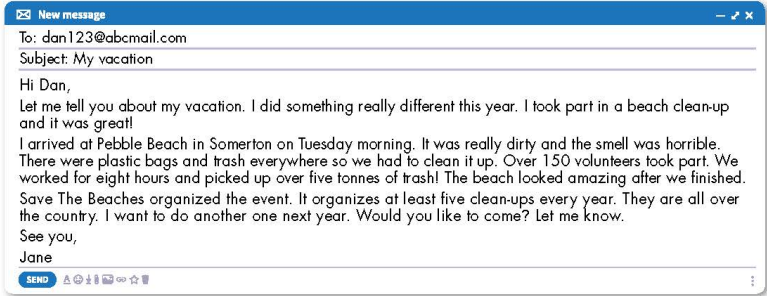
1. Jane's vacation wasn't the same as last year. _________
2. She didn't enjoy cleaning up the beach. _________
3. The beach looked really bad when she arrived. _________
4. They get money for cleaning up the beach. _________
Look and read. Choose the correct answer (A, B, or C).
(Nhìn và đọc. Chọn đáp án đúng (A, B hoặc C).)
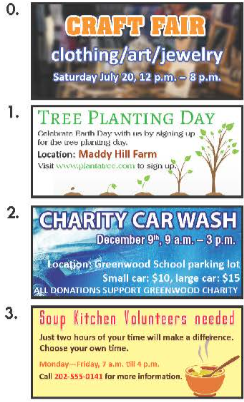
Example: (Ví dụ)
A. The craft fair lasts two days.
(Hội chợ thủ công kéo dài 2 ngày.)
B. You can buy bracelets and rings here.
(Bạn có thể mua vòng và nhẫn ở đây.)
C. You can visit the craft fair in the morning.
(Bạn có thể đến hội chợ thủ công vào buổi sáng.)
1.
A. You don't need to sign up to take part in this event.
(Bạn không cần đăng ký để tham gia sự kiện.)
B. You can sign up at Maddy Hill Farm.
(Bạn có thể đăng ký ở nông trại Maddy Hill.)
C. They organize this event to celebrate Earth Day.
(Họ tổ chức sự kiện này để kỷ niệm Ngày Thế giới.)
2.
A. The car wash raises money for local poor students.
(Rửa xe ô tô gây quỹ dành cho học sinh khó khăn.)
B. Volunteers wash a big car for a $15 donation.
(Tình nguyện viên rửa một chiếc ô tô lớn sẽ có 15 dola quyên góp.)
C. You can only visit the charity car wash in the morning.
(Bạn có thể chỉ đến rửa xe gây quỹ vào buổi sáng.)
3.
A. The soup kitchen needs volunteers for the weekend.
(Súp gà cần tình nguyện viên vào cuối tuần.)
B. Volunteers work for two hours every day.
(Tình nguyện viên làm việc khoảng 2 tiếng mỗi ngày.)
C. You can choose when to volunteer from Monday to Friday.
(Bạn có thể chọn khi làm tình nguyện từ thứ Hai đến thứ Sáu.)
1. How can we preserve ancient wonders? Listen and read to find out.
(Chúng ta bảo tồn các di tích như thế nào? Nghe và đọc để tìm hiểu.)
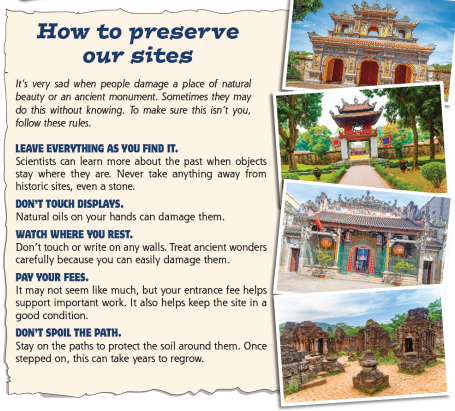
How to preserve our sites
It’s very sad when people damage a place of natural beauty or an accident monument. Sometimes they may do this without knowing. To make sure this isn’t you, follow these rules.
Leave everything as you find it.
Scientists can learn more about the past when objects stay where they are. Never take anything away from historic sites, even a stone.
Don’t touch displays.
Natural oils on your hands can damage them.
Watch where you rest.
Don't touch or write on any walls. Treat ancient wonders carefully because you can easily damage them.
Pay your fees.
It may not seem like much but your entrance fee helps support important work. It also helps keep the site in a good condition.
Don’t spoil the path.
Stay on the paths to protect the soil around them. Once stepped on, this can take years to regrow.
Video
Where did you get that?
In 2019, in the UK, people throw away over 800,000 tonnes of clothing. While recycling cloth is a great start, it is 1) __________ better for the environment if we actually reuse our old clothes first. Here are a 2) __________ ways.
⊳ Before you decide to throw your favourite old white T-shirt in the rubbish, think about 3)__________ you could change it yourself. Paint it, embroider it, stamp it, dye it, the options are limitless.
⊳ Now you don't 4) __________ to say goodbye to your old blue jeans. Using the most basic sewing skills, a few buttons, ribbons and lace you can quickly make a fantastic denim handbag.
⊳ We all know that inexpensive high street fashion is the easiest 5) __________ to update your wardrobe, but these clothes wear out very quickly. When you can, buy clothes that are high-quality or buy vintage clothes.

embroider: thêu
stamp: tem
dye: nhuộm
sewing: may vá
lace: ren
vintage: cổ điển
2. Read the text again. Fill in each gap with ONE appropriate word. Compare with your partner.
(Đọc lại đoạn văn bản. Điền vào mỗi chỗ trống với một từ thích hợp. So sánh với bạn của bạn.)
Sounds like great work!
(Nghe có vẻ là công việc hay đó!)
1. Listen and read.
(Nghe và đọc.)
Minh: Hi, Tom. Are you back in Ha Noi?
Tom: Yes, I came back yesterday. Can we meet up this Sunday morning? I bought you a board game.
Minh: Sure, I can’t wait! But our Green School Club will have some community activities on that morning.
Tom: What activities does your club do?
Minh: Well, we pick up litter around our school and plant vegetables in our school garden.
Tom: School gardening? That’s fantastic!
Minh: Yes. We donate the vegetables to a nursing home. Does your school have any activities like these?
Tom: Yes. We donate books to homeless children. We also have English classes. Last summer, we taught English to 30 kids in the area.
Minh: Sounds like great work!
Tom: Thanks.
Minh: … So, let’s meet in the afternoon then.
2. Read the conversation again and tick (✓) the appropriate box.
(Đọc lại đoạn hội thoại và đánh dấu ✓ vào ô đúng.)
|
Community activity |
Minh’s club |
Tom’s club |
|
1. picking up litter |
|
|
|
2. planting vegetables |
|
|
|
3. donating books |
|
|
|
4. donating vegetables |
|
|
|
5. teaching English |
|
|
Changing our neighbourhood
(Việc thay đổi trong khu phố của chúng tôi)
3. Work in pairs. Read the poster about the volunteer activities for teenagers at Lending Hand. Write the project number (1-3) next to its benefit (A - E).
(Làm việc theo cặp. Đọc tờ áp phích về các hoạt động tình nguyện dành cho thanh thiếu niên trong chương trình Lending Hand. Viết số của dự án 1-3 bên cạnh lợi ích của nó A-E.)
WELCOME TO LENDING HAND
(Chào mừng đến với Lending Hand)
Here are some activities you can do when you join our projects:
(Dưới đây là một số hoạt động bạn có thể làm khi tham gia các dự án của chúng tôi)
1. Protect the environment: (Bảo vệ môi trường)
- You can plant trees in your environment. (Bạn có thể trồng cây trong môi trường của bạn.)
- You can join clean-up activities. (Bạn có thể tham gia các hoạt động dọn dẹp.)
2. Help street children: (Giúp đỡ trẻ em đường phố)
- You can donate food and clothes. (Bạn có thể quyên góp thực phẩm và quần áo.)
- You can teach street children to read and write. (Bạn có thể dạy trẻ em đường phố đọc và viết.)
3. Help old people: (Giúp đỡ người già)
You can sing and dance with the elderly in a nursing home.
(Bạn có thể hát và nhảy với những người già trong viện dưỡng lão.)
Benefits
_________ A. making the elderly less lonely.
_________ B. making the neighbourhood greener
_________ C. helping feed children
_________ D. helping children have a better future
_________ E. making the neighbourhood cleaner
Reading
1. Work in pairs. Circle the activities you would like to do at your school.
(Làm việc theo nhóm. Khoanh tròn hoạt động bạn thích làm ở trường.)
A. growing vegetables in the school garden (trồng rau trong vườn trường)
B. tutoring other students (dạy kèm các học sinh khác)
C. collecting books for the school library (sưu tầm sách cho thư viện trường)
2. Read the passage and match the highlighted words with their meanings.
(Đọc đoạn văn và nối những từ được đánh dấu với nghĩa của chúng.)
|
1. give 2. give and receive 3. every month 4. pleased 5. teach |
Bright Future school has many community activities for students. The school believes that a good way for students to develop themselves is through community service. All students can join any of these different projects:
- Tutoring: Upper grade students tutor lower grade students.
- Postcard-to-Help: Students make and sell postcards to raise money for local children.
- Visit-to-Read: Students visit a nursing home monthly and read books to the elderly.
- Garden-to-Give: Students grow vegetables and donate them to local schools.
- Paper-Plant-Exchange: Students collect paper and exchange it for plants. They then look after the plants in their school garden.
Students learn that they can help people and the world around them when they do community service. They feel useful and proud because they do good things.
3. Read the passage again and tick (✓) T (True) or F (False).
(Đọc lại đoạn văn và chọn (✓) T (Đúng) hoặc F (Sai).)
|
|
T |
F |
|
1. Community service allows students to develop themselves. |
|
|
|
2. Each student can join only one project. |
|
|
|
3. They tutor younger students. |
|
|
|
4. Local children receive postcards from the Postcards-to-Help project. |
|
|
|
5. Students receive plants when they give paper. |
|
|
Speaking
4. Work in pairs. Read about these students. Write the names of the projects you think they should join in the Projects column.
(Làm việc theo cặp. Đọc về những học sinh này. Viết tên của những dự án mà em nghĩ họ nên tham gia vào cột Dự án.)
|
A. Tutoring (Dạy kèm) B. Postcard-to-Help (Bưu thiếp giúp đỡ) C. Visit-to-Read (Thăm hỏi và đọc sách) D. Garden-to-Give (Khu vườn cho đi) E. Paper-Plant-Exchange (Trao đổi cây xanh và giấy) |
|
|
Projects |
|
1. Nick likes reading books. He has a very nice voice, and he is also patient. |
|
|
2. Ann is very good at maths and literature. She also loves children. |
|
|
3. Minh loves collecting and making postcards. |
|
|
4. Mark loves nature. He likes watching programmes about plants. He also likes being outdoors. |
|
|
5. Tome likes collecting newspapers. |
|
4. Read Tom's email to Nam about his school activities last summer.
(Đọc email của Tom gửi cho Nam về các hoạt động ở trường của cậu ấy vào mùa hè năm ngoái.)
To: nam@webmail.com
Subject: School activities last summer
Dear Nam,
How are things? Did your school have any community activities last summer?
We did some very interesting activities. We collected rubbish in a nearby park. We also planted trees. Then we watered them every day, and it was enjoyable to watch them grow up. We also had a lot of fun and learnt some skills.
Please write to me and tell me about your school activities.
Best,
Tom
1. Choose the correct word (A, B or C) to fill in each blank in the following passage.
(Chọn từ đúng (A, B hoặc C) để điền vào chỗ trống trong đoạn văn dưới đây.)
My school has a number of volunteer activities every summer. The activities include donating books to village children, (1) ______ kids in the neighborhood, teaching English to primary students, reading books or cooking food for the (2) ______Our school staled this programme five years ago. Every student can join one or two activities. In the beginning, we thought about (3) ______we should join in these activities. We then thought about what (4) ______we wanted to do. Those who like reading could choose to collect and donate (5) ______Those who are good at English could (6) ______ primary students. Finally, we signed up for the activities we chose. Our teachers often encourage us to (7) ______committed. They also help us when we need it. We have a lot of fun and learn many things from (8) ______the activities.
1.
A. tutor
B. tutored
C. tutoring
2.
A. rich
B. needy
C. young
3.
A. what
B. when
C. why
4.
A. activities
B. jobs
C. work
5.
A. clothes
B. books
C. vegetables
6.
A. learn
B. talk
C. tutor
7.
A. live
B. stay
C. work
8.
A. doing
B. working
C. playing
2. Read the text and do the exercises.
(Đọc đoạn văn và làm các bài tập.)
People first used the word ‘volunteer’ in 1795, but in England, there were at least 500 volunteer hospitals long before that. The YMCA in London became the first volunteering organization in 1844. It provided help to needy people and held classes to help people develop skills. The Red Cross became the first international charity organization in 1863. Volunteer work is becoming more and more popular in the world. For example, in the USA, about one-fifth of the population does volunteer work. In Europe, thousands of volunteer programmes are run in different countries.
Everyone can do volunteer work to help their community. Volunteer activities include donating food and clothes, joining clean-up projects, tutoring children, protecting wild animals, etc. Volunteers work not for money but to help people in need and to connect with others.
a. Match each word or phrase highlighted in the text with its meaning.
(Nối mỗi từ hoặc cụm từ được bôi đậm trong đoạn văn với nghĩa của nó.)
b. Tick (√) T (True) or F (False)
(Tích (√) T (Đúng) hoặc F (Sai))
1. People first used the word ‘volunteer’ in the 18th century.
2. The YMCA held classes that taught people skills.
3. The Red Cross is an American charity organisation.
4. Volunteers work to help and connect with others.
5. One example of volunteer work is donating clothes.
3. Read the passage and answer the questions by circling A, B or C.
(Đọc đoạn văn và trả lời các câu hỏi bằng cách khoanh tròn A, B hoặc C.)
Choosing to volunteer takes up some of your time. Some people say that they do not have time to help others, so they don’t volunteer. But scientists say giving time to help others benefits us.
The first benefit of volunteering is that it helps us learn to be flexible. Volunteers have to be ready for changes and stay flexible when solving problems. Second, volunteering can improve our health because it requires us to be active. A report found that Americans who volunteer 100 hours or more a year are the healthiest people in the country. Third, volunteers have opportunities to develop more relationships. They often work in teams, and team members get to know each other and sometimes even become friends. Moreover, volunteers often help needy people, so they may feel thankful for what they have. For these reasons, volunteers are generally positive and are less likely to become depressed.
So if you have not joined a volunteer activity yet, think about it. You are likely to benefit from doing so.
1. What is the main idea of the passage?
A. There are different types of volunteer activities.
B. What to expect when you do volunteer work.
C. There are some good reasons why you should do volunteer work.
2. Which is NOT true about volunteers?
A. They are the strongest and most active.
B. They are flexible thinkers.
C. They are generally more positive.
3. Which is a benefit of doing volunteer work?
A. You will have a happier family.
B. You can have more friends.
C. You will never feel unhappy.
4. Why are volunteers often more positive?
A. They are the healthiest people in the country.
B. They stay active.
C. They often feel they are luckier than others.
5. How many benefits are mentioned in the passage?
A. Two.
B. Three.
C. Four.
6. What is the purpose of the passage?
A. To tell people not to join volunteer activities if they don’t have the time.
B. To encourage people to do some volunteer activities.
C. To explain the steps you should follow when you join volunteer activities.
7. Read the text and tick (√) the appropriate boxes. (1.0pt)
(Đọc đoạn văn và tích (√) vào các hộp thích hợp.) (1.0 điểm)
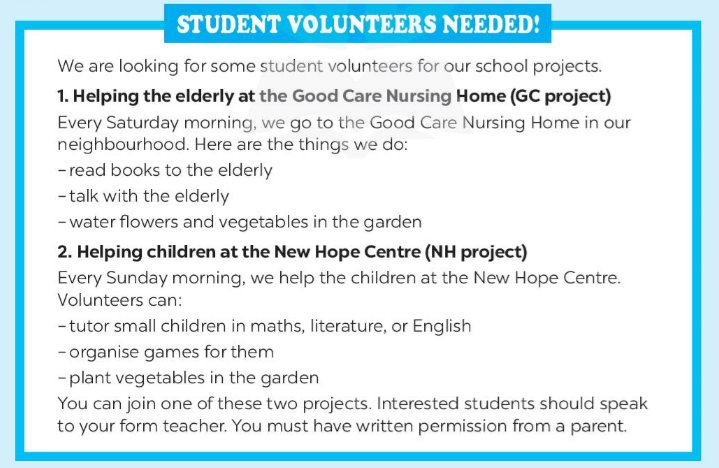
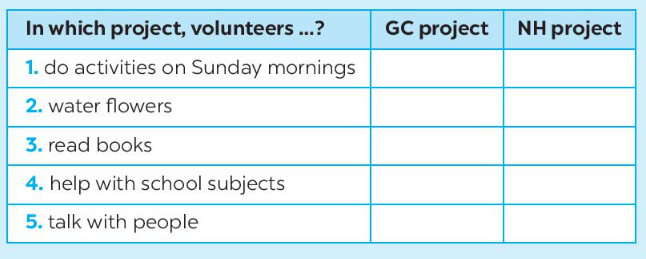
a. Read the text and choose the best summary.
(Đọc đoạn văn và chọn tóm tắt thích hợp nhất. )
1. Ways to do charity at school
2. Ways to help the community
There are a lot of things we can do for our community. I think we should have a fun run to raise money. We can ask our teachers to help us. We can join the run from our school to any place in the town. We can use the money to help poor children in the country. We can buy books for their school. We can also collect clothes for them. We can also help the homeless animals. Cats and dogs at animal shelters often don't get the care they need. They often get sick and need medicine. We can ask our friends to give money for them. Volunteers can help take care of and play with these animals. We can also help give food to the animals and give them a bath.
b. Now, read and circle the correct answers.
(Bây giờ hãy đọc và khoanh tròn những câu trả lời đúng. )
1. We can join the run from...
a. the country
b. the town
c. the school
2. We can give poor children...
a. food
b. a bath
c. clothes
3. We can collect money for the homeless animals from...
a. our friends
b. volunteers
c. our teachers
4. We can give the animals...
a. money
b. food
c. medicine
5. The animals can be taken care of by...
a. volunteers
b. teachers
c. friends
a. Fill in blanks using the Past Simple form of the verbs in the box.
(Điền vào chỗ trống sử dụng thì Quá khứ đơn chia động từ trong hộp.)
|
volunteer serve organize raise plant clean |
HELPING THE COMMUNITY
Teenagers can do different types of community service to help people, animals, and places around them. Last year, my friends and I (1) ___________ volunteered at a soup kitchen. We (2) __________ food and (3) __________ the dishes there. Three weeks ago, our school (4) __________ a fun run to raise money for charity. We (5) ________ more than five thousand dollars after the fun run. We also (6) __________ some trees and flowers in local parks. What did you do to help your community?
a. Read Tim's email to Alice. Would Tim like to take part in future clean-ups?
(Đọc email của Tim cho Alice. Tim có muốn tham gia vào việc dọn dẹp trong tương lai không?)
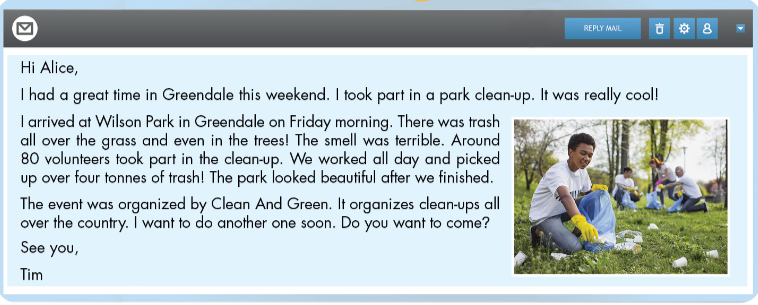
b. Now, read and answer the questions.
(Bây giờ, hãy đọc và trả lời các câu hỏi.)
1. Where did the clean-up happen? (Việc dọn dẹp xảy ra ở đâu?)
2. How many people helped to pick up trash? (Có bao nhiêu người đã giúp nhặt rác?)
3. How much trash did they pick up? (Họ đã nhặt bao nhiêu rác?)
4. Who organized the clean-up? (Ai đã tổ chức dọn dẹp?)
Read the text about charity events. Choose the correct answer (A, B, or C).
(Đọc văn bản về các sự kiện từ thiện. Chọn câu trả lời đúng (A, B hoặc C).)
MY SCHOOL'S CHARITY EVENTS
Greg Jones, October 18
At my school we have a charity event every year. We raise money for the local soup kitchens and charity. Charity events are hard work, but they're fun, too!
Each class holds a different event. Last month, my sister's class had a talent show, and my class had a bake sale. We organized a bake sale because we learned how to make cakes in our cooking lessons. Everyone baked cakes at home then brought them to the school playground to sell. We sold lots of cakes and cookies and raised 85 dollars, so everyone was very happy!
Last year, we joined a fun run in the park. My class all ran or walked for 3 kilometers. We were all very tired, but we raised more money than this year. Maybe we will run again next year.
Example:
0. How often does Greg's school have charity events?
A. twice a year
B. once a year
C. once a month
1. Who organizes the school's charity events?
A. Greg's teachers
B. all classes
C. only Greg's class
2. What charity event did Greg's sister and her school friends organize this year?
A. bake sale
B. fun run
C. talent show
3. Before the charity event, Greg and his friends made cakes...
A. during cooking lessons.
B. on the school playground.
C. at home.
4. Greg thinks his class should have a fun run next year because they...
A. really like running.
B. want to raise more money.
C. want to run for 3 kilometers.
Read the text and fill in each gap with on word from the box:
Warm Clothes is a famous (1) _______ group in Viet Nam. Its members are both parents and their children. Last year, they (2) _______ many activities to help their community. The group collected clothes and sent them (3) _______ poor people in rural areas. The parents taught their children to make things from bamboo and bottles. They then sold these to buy books, and donate them to village children. They also (4) ________ to the villages and tutored small kids there. They really brought love to those (5) ________ villages.
Listen and choose the best answers A, B or C.








Danh sách bình luận